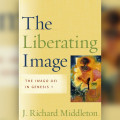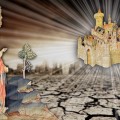Posts about the climate crisis
Posts touching on the theological and missional challenges and opportunities posed by the climate crisis.
There is an argument that there is a third creation account in the Old Testament, in addition to the two creation accounts of Genesis 1-2, in which God as storm deity defeats the chaos monster of the sea in order for dry land to emerge.Dahood, notably, argued that translation of Psalm 74:13-14 has… ()
I wrote most of this on a flight back from Doha on Christmas Eve. My wife has been at COP 28 in Dubai and at hydrogen conferences in Oman and Qatar—so plenty of opportunities to reflect on climate change from a very different angle. We also got to church a few times, where no one was talking about… ()
I am coming to think that the current mainstream view regarding “image of God” in Genesis 1:26-27 is mistaken. The consensus is that behind the expression is the idea that God is king, that he rules the cosmos, and that he has delegated some part of that benign and constructive rule to men and… ( | 4 comments)
Looking around for discussion of a theology of climate crisis, I came across a brief summary of the work of Gijsbert van den Brink, University Research Chair for Theology and Science at the Vrije Universiteit Amsterdam. The piece is by Matthew Wiley and is entitled “Life in the Anthropocene:… ( | 2 comments)
I argued in the previous post that the injunction to subdue the earth and rule over all living creatures in Genesis 1:26-28 cannot be construed in helpful modern terms as environmental stewardship or creation care. The language consistently evokes contexts of enslavement, violent suppression of… ( | 5 comments)
There is an argument that the Bible is partly to blame for the current environmental crisis because humanity was instructed from the get-go to subdue the earth and have dominion over all living creatures (Gen. 1:26-28). The historian Lynn White famously argued in a 1967 article, “The Historical… ( | 2 comments)
I am trying to give serious thought these days to how the church goes about its “mission” (for want of a better word). The methodology is usually pragmatic: the church as it currently is, in its various institutional forms, faces challenges of numerical decline or social irrelevance, and asks what… ( | 2 comments)
I am very interested in the “eschatology” of Jesus and his followers—how they predicted future events—not only because it is the key to understanding the New Testament but also because it teaches us how to think theologically about the crises of our own age. So I was keen to listen to a Nomad… ( | 2 comments)
Helge Seekamp recently drew attention to a paper by Jem Bendell, Professor of Sustainability Leadership at the University of Cumbria, entitled “Deep Adaptation: A Map for Navigating Climate Tragedy.” He suggests that Bendell gives us a “secular agenda for an apocalyptic time.” I think that the idea… ( | 8 comments)
I thought we were done with the two visions of the descent of the holy city from heaven, but another question has come up, an obvious one. Why are the visions the wrong way round? Why does John first see the descent into the new creation, then the descent into history after the… ( | 3 comments)
In our age of intense ecological anxiety, Paul’s sympathetic portrayal of creation as a suffering thing, yearning for liberation from its bondage to corruption (Rom. 8:19-22) has an obvious appeal. It’s a remarkable image, but how much modern theological weight can it bear? Can it support the sort… ( | 17 comments)
The practical question that I’m trying to answer here is: how do we assess the effectiveness or validity of missional activity when the “product” is more qualitative than quantitative? Church growth models are proved effective if they result in larger churches or the multiplication of churches. The… ( | 2 comments)
Speaking at Davos last year, David Attenborough said, “The Holocene has ended. The Garden of Eden is no more.” He makes the point again in the compelling new Netflix documentary A Life on Our Planet.The juxtaposition of terms from two very different fields of discourse is intriguing. Can we do… ( | 3 comments)













Recent comments